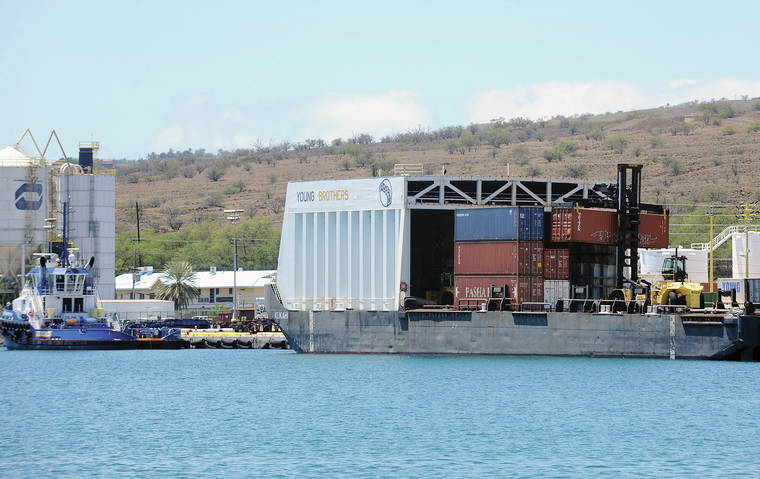As the investigation continued Tuesday into the loss of cargo containers from a Young Brothers barge on its way to Hilo Harbor, so did efforts to keep the 120-year-old shipper afloat.
The container mishap occurred about a month after the interisland shipper notified the state on May 26 that it needed $25 million in federal Coronavirus Aid, Relief and Economic Security (CARES) Act funds and other relief to stay afloat through the end of the year.
Without a bailout, the company said it would have to maintain a now-extended reduced sailing schedule and make additional cuts. Since then, no additional cuts have been made and the company deferred suspending less-than-container load, or LCL, and mixed cargo and changed Hilo barge service back to Monday after receiving community feedback.
The Public Utilities Commission subsequently opened an emergency investigative proceeding into the matter and has yet to issue a report on the request after grilling Young Brothers and executive leadership, including president Jay Ana, on June 10.
Meanwhile, the state House Committee on Finance on Tuesday deferred decision on a gut-and-replace bill that as currently written would allow for loans to water carriers to “address the impacts of the coronavirus 2019 disease pandemic and offset certain costs incurred.”
“They continue to struggle trying to figure out an approach — whether DOT is the right approach, PUC proceeding is the right approach — so at this point in time, this measure will be deferred,” said Finance Chairwoman Sylvia Luke on Tuesday afternoon.
Senate Bill 1427 would permit the PUC to exempt a water carrier from the Hawaii Water Carrier Act in the “public interest,” authorize the state Department of Transportation to enter into a loan contract using Harbors Special Funds and temporarily authorize the DOT ratemaking authority for water carriers.
Among the provisions are that loans not exceed more than $3 million per month and the aggregate total of all loans not exceed $20 million in a 12-month period. The proposal also calls for the loan recipient to repay all loans plus a “reasonable rate of interest.”
Further, any loan contract entered into would require Young Brothers to resume the number of port calls it serviced on Jan. 1, prior to the modified sailing schedule implemented. Further, transport of LCL cargo to or from Lanai and Molokai must continue and negotiations be made in good faith with agriculture or livestock entities or business to set standards for the interisland shipment of livestock.
Ana said Tuesday that the company “appreciates the thoughtful solutions proposed by the state House of Representatives.”
“We look forward to continuing the productive dialogue about weathering these challenging times and charting a sustainable course for the future,” he said.
Another bill in the Legislature, House Bill 2475, would provide subsidies to cargo carriers to offset costs incurred by providing services to ports on the neighbor island counties.
It would also authorize the PUC to appoint a receiver for a failing regulated water carrier to ensure uninterrupted interisland shipping services, extend the duration the PUC can permit a regulated water carrier to operate in emergency situations, allow the PUC to waive regulatory provisions in “order to restore or protect essential water carrier services” and permit the PUC to authorize new water carriers to enter service in Hawaii.
The Transportation Committee, before passing the measure June 24, amended the bill to allow the DOT to provide subsidies to cargo carriers. It is now awaiting a hearing before the Senate Ways and Means Committee.
In other Young Brothers-related news, a resolution urging Young Brothers and the PUC to find long-term solutions to ensure uninterrupted cargo service is expected to be heard during an upcoming meeting of the Hawaii County Council.
Introduced by Kohala Councilman Tim Richards and Hilo Councilwoman Sue Lee Loy, Resolution 679 emphasizes the critical and unique role Young Brothers plays by ensuring food, cargo, fuel, vehicles and agriculture products are able to get to and from their destinations safely.
It also notes the alternate funding sources — from the federal government, for example — that the company can tap to remain in operation, cites the PUC’s statutory oversight role in keeping charges “just and reasonable” and calls on state and federal leaders and regulators to ensure the “unthinkable threat of a shutdown in cargo operations does not happen,” according to a press release.
Email Chelsea Jensen at cjensen@westhawaiitoday.com.






